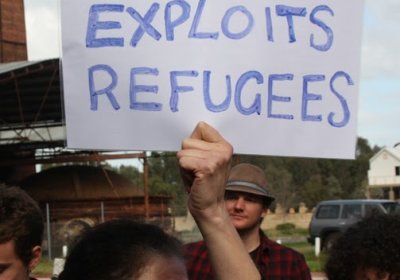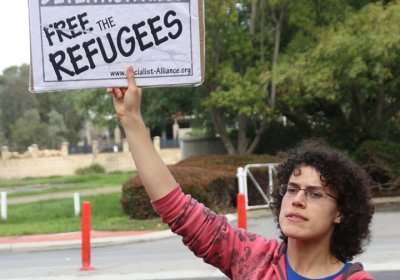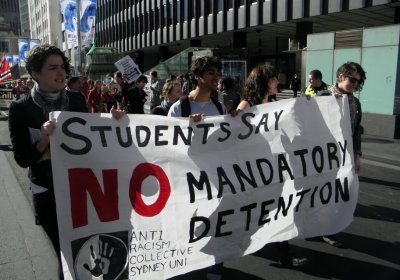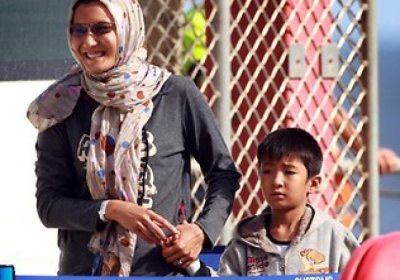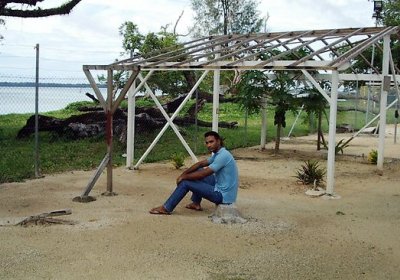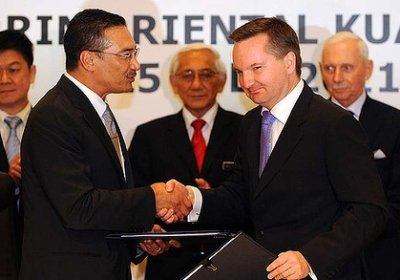Australia’s ability to remain a signatory to the UN refugee convention would be put in serious doubt if the government succeeded in weakening protection for refugees in the migration act, prominent human rights lawyer Julian Burnside QC told Green Left Weekly.
“The judgement was clear that the arrangement that had been made with Malaysia has been made legally invalid,” he said.
“The question is whether the government thinks having signed the convention limits the range within they can change the act.
Jay Fletcher
Now that the Labor government has almost entirely reneged on its 2007 election promise to end Australia’s sickening abuse of refugees, the two big parties are united on an issue they have so vehemently pretended to disagree.
Unhappy with the High Court’s interpretation of the law — that Australia must uphold fundamental human rights when making policies on refugees, and that deporting them to a country that does not have such rights violates the law — the Labor government is cajoling the opposition to agree to water down Australia’s refugee protections.
Australian Solicitor-General Stephen Gageler, who defended the government’s Malaysia solution in the High Court, confirmed the court’s decision “cast doubt” on all offshore processing, immigration minister Chris Bowen said on September 4.
British-based multinational corporation Serco Group is bidding for more contracts with Australian federal and state governments. Worth £4.3 billion ($6.6 billion), Serco markets itself as a “solution to government”, which takes over government services and runs them for profit.
It has run Australia’s disastrous and increasingly unstable refugee detention centres since 2009, owns two Australian super-prisons and took over Western Australia’s court security and custodial services in June.
A poll commissioned by new online campaign NewsStand found 61% of Australian people agreed a “public inquiry into the Australian media is necessary so the public can better understand the relationship between politicians, corporations and media outlets”.
NewsStand, backed by GetUp, then launched an online petition on August 11 calling for parliament to “publicly scrutinise the media landscape as a whole”, which quickly gathered almost 30,000 signatures.
The August 31 decision of the High Court to stop the Labor government’s bid to deport up to 800 asylum seekers to Malaysia is welcome news and a success for the refugee rights campaigners and the lawyers who led the case.
But the judgement has not, as many hoped, spurred the government to change direction.
In fact, immigration minister Chris Bowen said the government may even now consider reopening the Nauru detention centre and was “not ruling anything in or out”.
During the historic High Court challenge to the federal government’s so-called Malaysia solution, barrister Debbie Mortimer, representing refugees that face expulsion from Australia, said “fundamental rights were at stake” in the case.
Federal Labor MP Anna Burke captured the Gillard government’s increasingly right-wing refugee policy when she said plans to reopen the Manus Island detention centre in Papua New Guinea would be “going back to something we said we wouldn’t do, which is the Pacific solution”.
Burke told ABC news on August 15 she had raised concerns in caucus about an overseas detention centre as well as the “Malaysia solution”, which faces a legal challenge in the High Court and could also be subject to a parliamentary inquiry.
About 200 people have arrived on boats to claim refugee protection in Australia since the Australian and Malaysian governments signed a deal to “swap” refugees on July 25. The countries agreed to exchange up to 800 refugees in Australia for 4000 refugees registered with the United Nations in Malaysia.
The immigration department has refused to look at the new arrivals’ claims for asylum, but is holding them in an isolated compound of the Christmas Island detention centre. A boat that arrived on August 11 carried more than 100 refugees, many of them children.
Federal riot police have the go-ahead to use Tasers, tear gas, batons, capsicum spray and handcuffs to force refugees onto a flight to Malaysia from Christmas Island. Immigration officials say they will film the ordeal to put online as a “potent message” to other refugees.
The first asylum seekers to undergo this ordeal arrived in Australian waters less than a week after the “Malaysia solution” came into effect. A boat carrying 55 Afghan, Iranian and Iraqi refugees was intercepted near Scott Reef on July 31.
More than one third of the asylum seekers on the boat are children.
Scenes were reported of people burying themselves in shallow graves in the Christmas Island detention centre on July 24, as refugees across the country continued defiant protests despite harsh crackdowns.
Hunger strikes and ongoing protests also took place in the Northern Immigration Detention Centre in Darwin and the Scherger military base detention centre in far-north Queensland.
At Christmas Island, after riot police assaulted refugees with tear gas and “bean bag” shootings, they raided rooms and rounded up supposed “ringleaders”.
The Australia-Malaysia refugee “swap” deal, signed in Kuala Lumpur on July 25, further persecutes people who have escaped conflict and terror and have an international right to seek asylum in Australia.
The Australian government said the plan was intended to attack the “people smugglers’ business model”. But, in reality, it is a high-priced human trafficking deal between two governments known for discriminating against refugees.
- Previous page
- Page 13
- Next page
